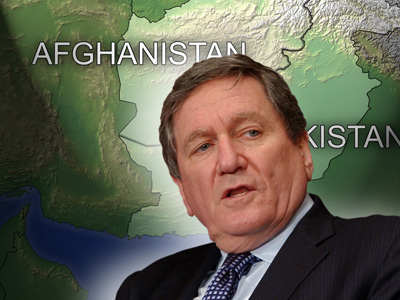Richard Holbrooke’s Game-Changing Diplomacy
HuffPost |

By Parag Khanna
This past June, I organized a private breakfast meeting for Richard Holbrooke, Obama's special envoy for Afghanistan and Pakistan, in a hotel salon in Islamabad, Pakistan. I hand-picked rising stars from the country's parliament and NGOs, giving them the chance to have at it with the man so many in Pakistan came to call the new "Viceroy." After patiently listening one by one to all of their complaints and proposals, he unleashed what anyone who has ever worked with or encountered Holbrooke would recognize as a vintage monologue. "I have yet to hear one single original idea or recommendation from any one of you," he brusquely admonished. The moment was at once deflating but also elevating. He expected more from them. Pakistan's next generation elites didn't have the answer to their own problems, and this was Holbrooke's greatest worry. Indeed, his final words to his Pakistani surgeon at George Washington University Hospital were, "You've got to stop this war in Afghanistan."
Holbrooke was a demanding character, but in equal parts to his colleagues in the U.S. government, his interlocutors and himself. This is why we have to separate the controversial individual, now sadly departed, from what he represents, which we must preserve at all costs: the guerrilla envoy interested more in solutions than protocol.
Because he served across so many decades and administrations, he came to embody the shift from the rigid old diplomacy of cables and secrecy to our new era of playing all sides with savvy and tactical leaks. His style directly challenged the traditional diplomatic virtues of patience and deference, which today seem like quaint delay tactics, in favor of bluntness and stubbornness--hence his nickname "The Bulldozer" from the Balkan days. The truth that Holbrooke confronted us to recognize is that real diplomats don't use vague concepts such as "soft power" or "smart power." They calculate which mixture of means and methods will get the job done, period.
Holbrooke combined strategist and tactician in one. His book on mediating the Dayton Accords that ended the Yugoslav wars of the 1990s should still be required reading today for its distillation of general principles from the intensely particular circumstances of the Balkans. Couched in this memoir are lessons such as the need for early recognition and engagement in brewing crises, and using personal connections where necessary to open new channels of communication. Holbrooke was attuned to the Balkans before almost anyone, for he had backpacked there after high school while still a teenager.
His clear and consistent articulation of positions, both moral and strategic, was not just for back-rooms either; he tirelessly took his case to the world's public through the media, a reminder soft-spoken and camera-shy diplomats to stop debating "public diplomacy" and actually take diplomacy to the public. At the same time, sly signaling is no substitute for direct, face-to-face communication. How else to send the message to Milosevic and Karadzic that if he left the negotiating room in 1995 without a satisfactory guarantee that they would end the siege of Sarajevo, they might not live through the next American bombing?
Holbrooke was not a native expert on South-Central Asia, yet he coined the most succinct term to capture its knotted unity: "Af-Pak." The Obama administration recently chose to drop it from official use, but its accuracy keeps it alive in today's lexicon. He saw realities hard to obfuscate, and called it like it saw it. He also hated artificial timetables, writing in To End a War that "the mission should determine the timetable, not vice-versa." The past decade has witnessed both Presidents Bush and Obama ignoring this lesson, much to their embarrassment. Because he began his career began with, reached its apogee at, and ended grappling with some of America's toughest foreign policy conundrums, he knew that lofty targets are no substitute for tangible, on-the-ground progress, without which extraction would be a sin. This is why, even while deep into his Af-Pak duties, he never missed a chance to remind Americans and Europeans to guard the fragile stability that still governs Bosnia today.
Both President Obama and Secretary of State Clinton have eulogized Holbrooke as the "truest of public servants," but this elides another important way in which he was a transitional figure from old to new diplomacy. In fact, he was a hybrid diplomat, beginning as a Foreign Service Officer in Vietnam and running USAID in Morocco, but also working in major investment banks like Credit Suisse and private equity firms like Perseus. He rotated back into government as Ambassador to Germany and Balkans envoy, but also back out for private ventures. The credibility that such public-private personalities bring to the high table has become, for better or worse, the more complex reality of "public service."
A chief lesson all diplomats need to learn from Holbrooke is that diplomats have a higher calling than just representing the "national interest." They should think fundamentally about the end-state, helping others help themselves so that positions like his would not be necessary in perpetuity. He forced Afghan and Pakistani ministers to meet regularly to coordinate intelligence sharing, trade relations, and cross-border agricultural development programs. Why weren't they doing this already themselves?
The last time I saw Holbrooke face-to-face, seated next to each other on a flight several weeks ago, he was in a typical relaxed but excitable state. It was a Friday evening and he was tired, but he had stacks of newspapers and memos still to read. His immediate concern, though, was to find out when I would next be in "the region." He knew, above all else, that you can't know a place or shape its future unless you go there.
Parag Khanna is a senior research fellow at the New America Foundation and author of How to Run the World: Charting a Course to the Next Renaissance, to be published in early 2011 by Random House.